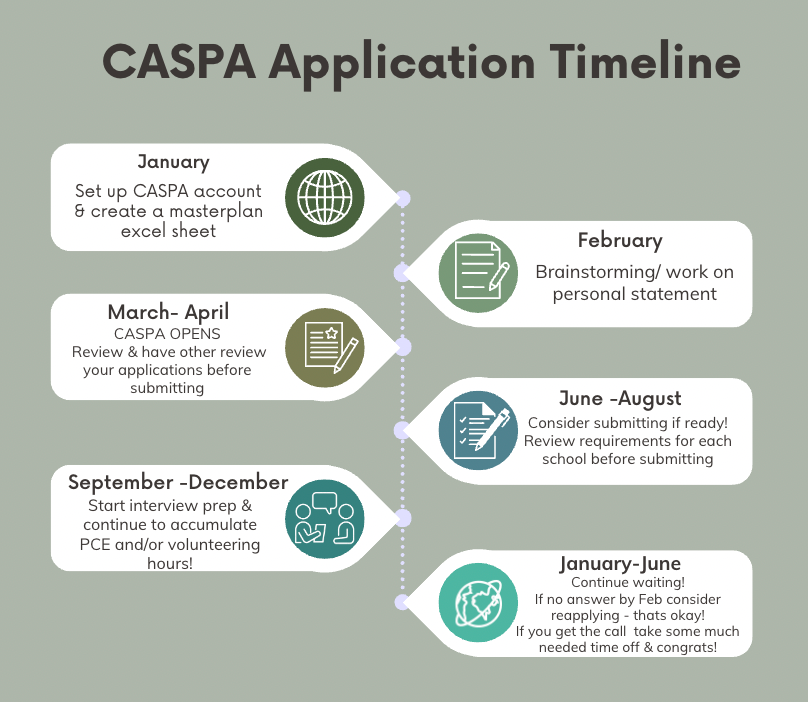It is important to note that this guideline offers a structured approach to spacing out your PA application. However, it is not a definitive blueprint; everyone's journey is unique. If you are uncertain about the PA application timeline, feel free to reference the template below and tailor it to suit your needs.

January
If you haven't already, this month presents an ideal opportunity to set up your CASPA account and familiarize yourself with its interface. Although we will host informational sessions on this topic, we encourage you to navigate the site independently and bring any specific questions to our sessions.
February-March
Consider kickstarting your personal statements this month. Starting can often be the most challenging aspect. One strategy is to jot down important points from your experiences in life and healthcare you wish to address that you feel set you apart. You can then list potential points you're considering but remain uncertain about due to word count constraints.
April
CASPA will officially open for the new cycle during this month and although not necessary, the application can be submitted during this month if complete. Yet, always prioritize meticulousness over speed. Before finalizing your application, it's important to have a few trusted individuals review the sections. For the personal statement, especially, consider seeking feedback from a PA or a healthcare professional; their insights can align more closely with what PA schools want to see.
May-August
Many applicants tend to submit during this period. However, each applicant's journey is distinct. If you find yourself needing an additional month, that's perfectly acceptable. Nonetheless, be mindful of schools with rolling admissions, as a delay could impact your competitiveness if their classes begin to fill up.
A key reminder: even post-submission, you can continue accruing hours. Keeping schools updated, either via email or directly in the application. Accruing hours not only strengthens your application, but in the event of needing to reapply, it shows you have continued to stay committed to working in medicine and shows improvement on the PCE section.
Coursework Note: Don't allow ongoing or planned coursework to deter you from applying, unless specific schools mandate all prerequisites be completed or have caps on pending coursework. Make sure to review each school's requirements before submitting!
September-December
This phase includes a mix of application submissions, interview invitations, rejections, and acceptances, and you may not even hear from all your schools yet. If the news isn't immediately favorable, maintain optimism. Until you receive a definitive rejection, there is always a chance! It’s highly recommended to start interview preparations during this span, even if you have not heard back yet, as it ensures readiness as some invitations provide only a brief notice.
Admission boards , "What steps has the candidate taken to improve their application from the previous cycle?"
January-June
The anticipation is tough, but perseverance is key. If responses from schools are sparse by February or March, consider your application strategy for the upcoming cycle. It provides the opportunity to become more competitive by continuing to accumulate hours or strengthen aspects of the application that you believe are not strong, for instance retaking courses if necessary to increase GPA. If you do receive an acceptance (congratulations!), consider taking time off to recharge before diving into PA school.
References
- "CASPA."(2023) CASPA Help Center, help.liaisonedu.com/CASPA_Applicant_Help_Center. Accessed 15 Dec. 2023.





